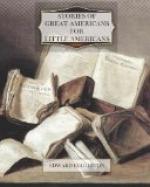The British fired bomb-shells and rockets at the fort. When these burst, they made a light. By this light Key could see that the little fort was still standing. He could see the flag still waving over it. He tells this in his song in these words:—
“And the rocket’s
red glare, the bombs bursting in air
Gave proof through the
night that our flag was still there.”
[Illustration]
But after many hours of fighting the British became dis-cour-aged. They found that they could not take the city. The ships almost ceased to fire.
Key did not know whether the fort had been knocked down or not. He could not see whether the flag was still flying or not. He thought that the Americans might have given up. He felt what he wrote in the song:—
“Oh! say, does
that star-span-gled banner yet wave
O’er the land
of the free, and the home of the brave?”
When the break of day came, Key looked toward the fort. It was still standing. There was a flag flying over it. It grew lighter. He could see that it was the American flag. His feelings are told in two lines of the song:—
“Tis the star
spangled banner, oh, long may it wave
O’er the land
of the free, and the home of the brave!”
Key was full of joy. He took an old letter from his pocket. The back of this letter had no writing on it. Here he wrote the song about the star-spangled banner.
The British com-mand-er now let Key go ashore. When he got to Baltimore, he wrote out his song. He gave it to a friend. This friend took it to a printing office. But the printers had all turned soldiers. They had all gone to defend the city.
[Illustration]
There was one boy left in the office. He knew how to print. He took the verses and printed them on a broad sheet of paper.
The printed song was soon in the hands of the soldiers around Baltimore. It was sung in the streets. It was sung in the the-a-ters. It traveled all over the country. Everybody learned to sing:—
“Then conquer
we must, for our cause it is just;
And this be our motto—’In
God is our trust’—
And the star-span-gled
banner in triumph shall wave
O’er the land
of the free, and the home of the brave.”
HOW AUDUBON CAME TO KNOW ABOUT BIRDS.
John James Au-du-bon knew more about the birds of this country than any man had ever known before. He was born in the State of Lou-is-i-a-na. His father took him to France when he was a boy. He went to school in France.
The little John James was fond of stud-y-ing about wild animals. But most of all he wished to know about birds. Seeing that the boy liked such things, his father took pains to get birds and flowers for him.
While he was yet a boy at school, he began to gather birds and other animals for himself. He learned to skin and stuff them. But his stuffed birds did not please him. Their feathers did not look bright, like those of live birds. He wanted living birds to study.




